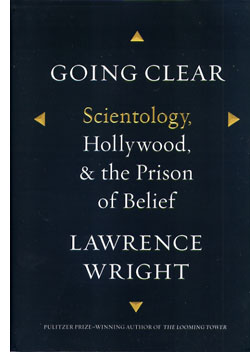 |
 Lawrence Wright
Lawrence Wright
Going Clear: Scientology, Hollywood, and the Prison of Belief
Alfred A. Knopf / Random House
US Hardcover First Edition
ISBN 978-0-307-70066-7
Publication Date: 01-17-2013
432 Pages; $28.95
Date Reviewed: 03-17-2013
Reviewed by: Rick Kleffel © 2013
Index:
Non-Fiction
General Fiction
Science Fiction
The difference between belief in fact and the beliefs of faith should be quite straightforward. We know the facts of day and night; we have faith that we know good and evil. Our beliefs in both fact and faith shape all our actions in this world. We control ourselves by keeping our behavior within the limits of what we know and what we believe. But because everything is complicated, we seek advice from outside ourselves as to what is fact and in what we should believe, and whether or not the separation between the two is as clear-cut as it seems.
L. Ron Hubbard sought to close that gap, first with Dianetics, and later with Scientology. He considered his creation technology, a mental toolkit, not theology, but sought to have it presented and treated as the latter. Or perhaps he considered it all science fiction, an art form he was particularly prolific at writing. There is a sense that he saw it all as a show that must go on.
The stories Hubbard created and the story of his life sprawled out to create the entire hermetic subculture we now know as Scientology. It's a big story, but Lawrence Wright manages to wrangle it all into his immersive new book, 'Going Clear: Scientology, Hollywood, and the Prison of Belief.' It proves to be an intense and compelling story that will keep readers involved long after the book is finished.
'Going Clear' covers more than 100 years of history to explore belief at every level, from the ability of Hubbard to believe in himself to his ability to inspire belief in others, to the beliefs that others created based on his work to the readers' own beliefs about psychology, religion, society, and who hits the truth-turns-to-fiction button.
Wright's a very smart writer, who gets readers in at ground level with Paul Haggis, as the now-famous director at the age of 21 has his first encounter with the group. What follows, over the next three-hundred-something pages is a superbly orchestrated tale of men with huge egos making a permanent mark. We meet young L. Ron Hubbard, and watch him become a pulp writer who can crank out more than 100,000 words per month. (That's three-hundred-something pages.) We see the birth of Scientology as Dianetics, a "science of the mind" inspired by Freud, that its creator thought would be greeted as genius. Instead, it was rejected as quaint, uninformed folk-art, and that rejection by the establishment of psychology was a wound from which Hubbard would never recover.
But Hubbard was, as described here, no less than a genius at "floating over the facts" and the art of self-promotion. He eviscerated every opportunity he found, and from the bloody entrails of self-aggrandizing failure built a mind-boggling success. Wright's mini-biography of Hubbard is superbly nuanced, gritty, insightful and generally generous. It's pretty clear that Wright does not have an axe to grind. On the other hand, he's willing to cut his way to the truth as revealed by his extensively notated text.
In 'Going Clear,' we read compulsively as Hubbard's empire grows beyond his own ability to control it, and it does both good and ill. Haggis reaps some significant benefits, and not just in terms of Hollywood connections. But current Church leader David Miscavige who starts out as a precocious fourteen-year old boy, ends up as a tyrannical prophet, who spends lots of time doling out punishment, every episode of which is carefully denied by the Church in footnotes. Belief is ever an issue in 'Going Clear,' even when it comes to the "facts," which can be easily denied, though not so easily disproved.
The Hollywood stories and stars are enjoyably entertaining, but also crucial to the narrative. Hubbard was a visionary in terms of knowing the power that media could hold. He never actually made a decent movie, but he was savvy enough to know that those who did could be potent allies. Wright only brings in the relevant and riveting aspects of the Hollywood connections, even if he does have a bit of fun with them. Sometimes, the truth manages to smile a bit.
Wright's detailed, transparent prose makes 'Going Clear' a constant pleasure to read. Every word and sentence carries its weight, and makes an almost impenetrable maze seem easily understood. While the proceedings here are disputed by the Church, which has a web page dedicated to the book, Wright's assiduous annotations dispel any inclination to suspect that he came to this project with any animus. For a book that has clearly raised the ire of many mentioned here, 'Going Clear' feels very even-handed, even though the prose, the plotting and the characters have the rich feel of a novel.
Lawrence Wright's 'Going Clear' is, in the final analysis, a remarkably straightforward treatment of a particularly weird story. Hubbard got his start in the pulps, and he had an amazingly fruitful imagination. It's only when we step outside, with the clarity that Wright provides here, that we can realize that Hubbard's story seems very much like a story he himself might have written. Of course, he did write this story, in a very real sense, by living it with such zest, such force that the reality he created for himself is now a world within our world. In the gulf between fact and faith, human imagination proves to have powers that even imagination itself may find hard to believe.
|
 |




